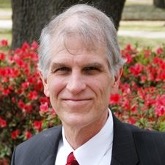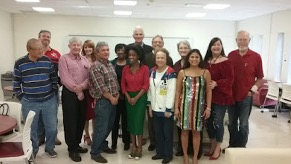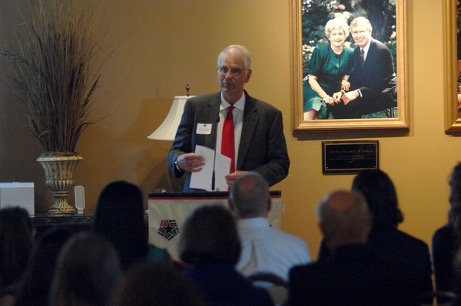Dr. Kevin B. Smith
Professor and Former Senior Associate Provost
Department of Sociology, Social Work, and Criminal Justice
Began working at Lamar University in 1981
Interviewed by Vidisha Barua Worley on 03/30/2023



Dr. Kevin Smith at the 2016 David J. Beck Fellowship awards held in November 2015. Picture taken from Lamar University's albums.
*Kevin B. Smith, Ph.D., is a Professor of Sociology. He has served Lamar University for 40 years. From 1985 to 1994, he was department chair and he returned as interim chair in 2011-12. During his tenure at Lamar, Dr. Smith also held the positions of Associate Vice President for Academic Affair, interim Vice President for Academic Affairs, interim Vice President for Student Engagement, and Senior Associate Provost. He teaches courses in social psychology and social stratification. Dr. Smith has also taught research methods, survey research, marriage and the family, statistics, social theory, and principles of sociology. Though administrative duties consumed most of his time, his research interests and publications have examined cognitions that support social class identification.
‘Lamar University was truly one of the first universities in the nation to partner with a third party and offer online master’s degrees and even doctoral degrees in Education. I was involved with that decision…. Criminal Justice and Social Work were in Public Affairs, and Sociology and Anthropology were in Sociology, and the two departments merged.’
‘I accepted a job as a tenure-track assistant professor in the Fall of 1981. I wanted to move back to the Houston area, so I accepted the job. Lamar University provided a wonderful career for me. A great opportunity for me to engage in my profession as a college professor. A wonderful university, in the 1980s it was growing rapidly. I was part of that.’
‘I was there for the 75th anniversary of the university. A large group photograph was taken, should be available somewhere in the library. Part of what I saw during my 40 years at Lamar was a transition from a traditional lecture-based university to a high-tech online university. When I arrived, we barely had typewriters. We had office telephones and only the privileged faculty even got the typewriters. I can remember the battles when computers first appeared, and the arguments we had over Apple versus PC. At the time, there were dozens and dozens of operating systems. I saw the university go through those stages. Arguments over whether students could learn in an online environment, whether faculty members could teach remotely, how much they could teach remotely, whether students …the remote environment, issues with rigor and academic dishonesty, and so on and so forth. In the 90’s…primarily students would read and correspond with instructors through e-mail and send text files back and forth. They usually had to come to campus for examinations. There were the rudimentary forms of online education back then.
‘I saw the university struggle with issues of admission standards, growth in terms of degree programs, and colleges. It was just following the merger of the Public Affairs Department with the Sociology Department. Criminal Justice and Social Work were in Public Affairs, and Sociology and Anthropology were in Sociology, and the two departments merged. It was a difficult mix to some extent. Criminal Justice has become much more academically focused than when I got here.’
‘I worked for a lot of presidents, a lot of provosts, and each one of course comes with a new agenda and a new scale and scope for the university… I also served as provost of the university for about a year and a half. That was in the early 2000s. There is an old saying that there is no better job than a tenured full professor, and there is a lot of truth to that. I truly enjoyed being an administrator because I knew what was happening, what could happen to the university. I had some modest input into decisions that were very consequential for the university.
‘Decision whether or not to offer online degrees. Lamar University was truly one of the first universities in the nation to partner with a third party and offer online master’s degrees and even doctoral degrees in Education. We had to go through the Southern Association. The Southern Association first denied it. Later, on appeal, approved it. When it approved, it opened the doors to what we have today. That truly made Lamar University unique and special. Should Texas taxpayers pay for faculty members and students who do not reside in the state of Texas. These were the kind of battles we had to fight. Then there were the issues of expectations of remote-based faculty members. How do you evaluate teaching and scholarship for someone who doesn’t even have an office on campus.’
‘I was involved in the elimination of the Lamar University System. We had some very dark and difficult times. Lots of people were terminated. Lots of votes of no confidence. Lots of hearings held in Austin and also on our campus. Carl Parker lost that battle. The faculty wanted to join the Texas State University System, and so we prevailed.’
‘I accepted a job as a tenure-track assistant professor in the Fall of 1981. I wanted to move back to the Houston area, so I accepted the job. Lamar University provided a wonderful career for me. A great opportunity for me to engage in my profession as a college professor. A wonderful university, in the 1980s it was growing rapidly. I was part of that.’
‘I was there for the 75th anniversary of the university. A large group photograph was taken, should be available somewhere in the library. Part of what I saw during my 40 years at Lamar was a transition from a traditional lecture-based university to a high-tech online university. When I arrived, we barely had typewriters. We had office telephones and only the privileged faculty even got the typewriters. I can remember the battles when computers first appeared, and the arguments we had over Apple versus PC. At the time, there were dozens and dozens of operating systems. I saw the university go through those stages. Arguments over whether students could learn in an online environment, whether faculty members could teach remotely, how much they could teach remotely, whether students …the remote environment, issues with rigor and academic dishonesty, and so on and so forth. In the 90’s…primarily students would read and correspond with instructors through e-mail and send text files back and forth. They usually had to come to campus for examinations. There were the rudimentary forms of online education back then.
‘I saw the university struggle with issues of admission standards, growth in terms of degree programs, and colleges. It was just following the merger of the Public Affairs Department with the Sociology Department. Criminal Justice and Social Work were in Public Affairs, and Sociology and Anthropology were in Sociology, and the two departments merged. It was a difficult mix to some extent. Criminal Justice has become much more academically focused than when I got here.’
‘I worked for a lot of presidents, a lot of provosts, and each one of course comes with a new agenda and a new scale and scope for the university… I also served as provost of the university for about a year and a half. That was in the early 2000s. There is an old saying that there is no better job than a tenured full professor, and there is a lot of truth to that. I truly enjoyed being an administrator because I knew what was happening, what could happen to the university. I had some modest input into decisions that were very consequential for the university.
‘Decision whether or not to offer online degrees. Lamar University was truly one of the first universities in the nation to partner with a third party and offer online master’s degrees and even doctoral degrees in Education. We had to go through the Southern Association. The Southern Association first denied it. Later, on appeal, approved it. When it approved, it opened the doors to what we have today. That truly made Lamar University unique and special. Should Texas taxpayers pay for faculty members and students who do not reside in the state of Texas. These were the kind of battles we had to fight. Then there were the issues of expectations of remote-based faculty members. How do you evaluate teaching and scholarship for someone who doesn’t even have an office on campus.’
‘I was involved in the elimination of the Lamar University System. We had some very dark and difficult times. Lots of people were terminated. Lots of votes of no confidence. Lots of hearings held in Austin and also on our campus. Carl Parker lost that battle. The faculty wanted to join the Texas State University System, and so we prevailed.’